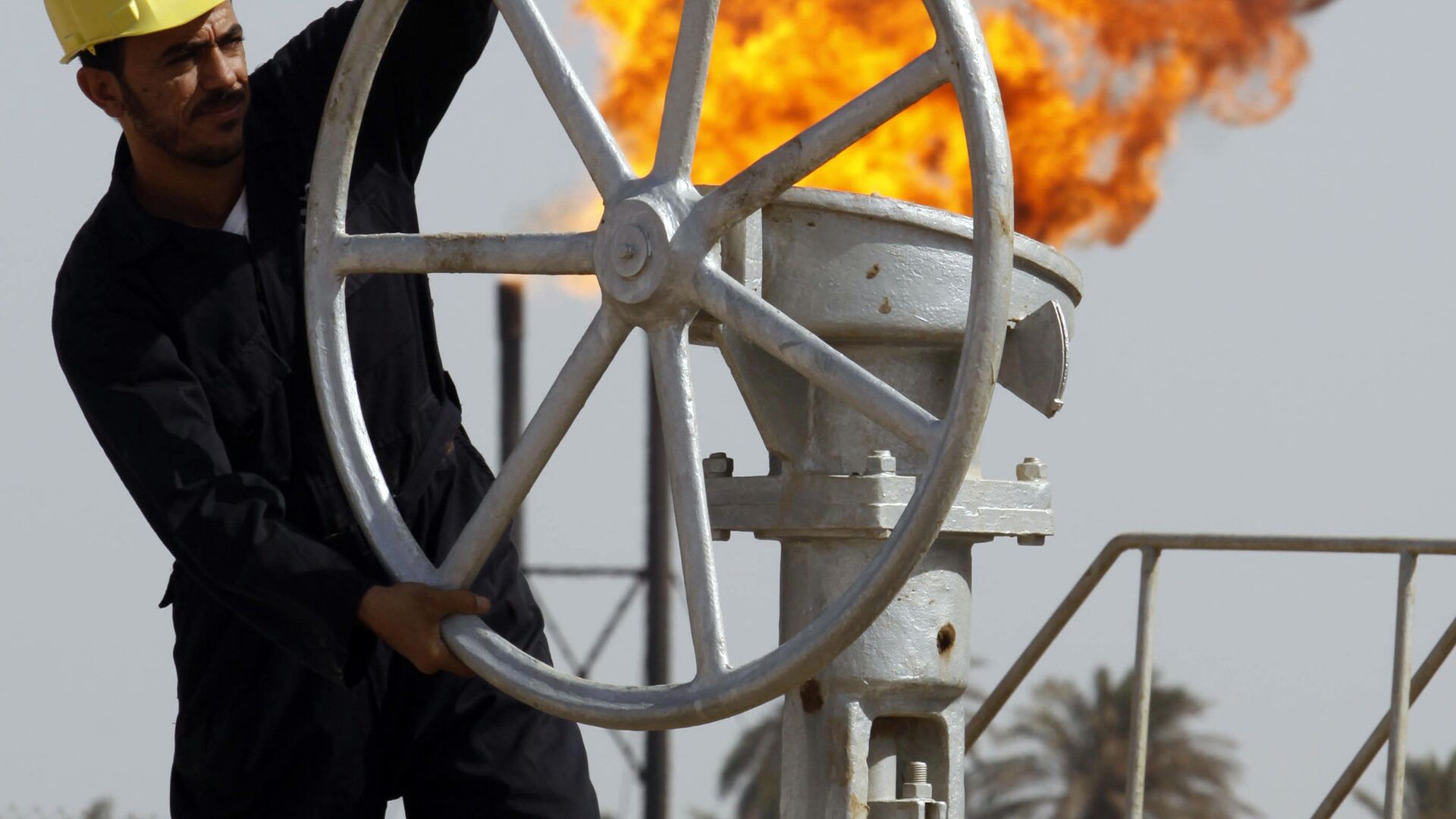https://sputnikglobe.com/20221005/iraq-to-cut-oil-production-by-220000-barrels-per-day-under-opec-deal---state-oil-company-1101552274.html
Iraq to Cut Oil Production by 220,000 Barrels Per Day Under OPEC+ Deal - State Oil Company
Iraq to Cut Oil Production by 220,000 Barrels Per Day Under OPEC+ Deal - State Oil Company
Sputnik International
MOSCOW (Sputnik) - Iraq will reduce oil production by 220,000 barrels per day under the new OPEC+ oil cut deal, State Organization for Marketing of Oil (SOMO)... 05.10.2022, Sputnik International
2022-10-05T21:55+0000
2022-10-05T21:55+0000
2023-01-08T16:43+0000
world
opec
oil production
iraq
https://cdn1.img.sputnikglobe.com/img/107511/21/1075112197_0:933:2017:2068_1920x0_80_0_0_eb5631c74f3c61bc36d387858238fa00.jpg
"Iraq's share of the reduction will be 220 thousand barrels per day," Alyasiri told the Iraqi News Agency.The price of oil without the OPEC+ deal could fall to $50 per barrel, Alyasiri noted.The Iraqi oil ministry said at the end of September that the country produced 4.6 million barrels of oil per day in August. At the same time, revenue from oil exports accounted for around $9.7 billion after declining four months in a row. The amount of Iraqi crude oil exports amounted to 101 million barrels.In 2020, 23 countries, including OPEC members and 10 non-cartel oil producers, reached a deal to voluntarily cut output amid the precipitous drop in oil demand as coronavirus-related shutdowns were taking place worldwide. After the initial agreement to cut production by 9.7 million barrels per day the deal was repeatedly revised to match market conditions. OPEC+ reached pre-pandemic production levels in August 2022.On Wednesday, OPEC+ announced that the alliance agreed to cut oil production by two million barrels per day from November, and will take production levels agreed for August as a reference point. The move was made in response to uncertainty in global oil market outlooks, in part caused by Western sanctions on Russian energy deliveries and the G7 plans to introduce a price cap on Russian crude. The decision received backlash from the US, which demanded an increase in production to battle rising domestic prices.
https://sputnikglobe.com/20221005/economic-experts-opecs-oil-cuts-to-fan-us--european-inflation-bring-western-model-to-reckoning-1101549471.html
iraq
Sputnik International
feedback@sputniknews.com
+74956456601
MIA „Rossiya Segodnya“
2022
Sputnik International
feedback@sputniknews.com
+74956456601
MIA „Rossiya Segodnya“
News
en_EN
Sputnik International
feedback@sputniknews.com
+74956456601
MIA „Rossiya Segodnya“
Sputnik International
feedback@sputniknews.com
+74956456601
MIA „Rossiya Segodnya“
opec, oil production, iraq
opec, oil production, iraq
Iraq to Cut Oil Production by 220,000 Barrels Per Day Under OPEC+ Deal - State Oil Company
21:55 GMT 05.10.2022 (Updated: 16:43 GMT 08.01.2023) MOSCOW (Sputnik) - Iraq will reduce oil production by 220,000 barrels per day under the new OPEC+ oil cut deal, State Organization for Marketing of Oil (SOMO) Director General Alaa Alyasiri said on Wednesday.
"Iraq's share of the reduction will be 220 thousand barrels per day," Alyasiri told the Iraqi News Agency.
The price of oil without the OPEC+ deal could fall to $50 per barrel, Alyasiri noted.
The Iraqi oil ministry said at the end of September that the country produced 4.6 million barrels of oil per day in August. At the same time, revenue from oil exports accounted for around $9.7 billion after declining four months in a row. The amount of Iraqi crude oil exports amounted to 101 million barrels.

5 October 2022, 19:08 GMT
In 2020, 23 countries, including OPEC members and 10 non-cartel oil producers, reached a deal to voluntarily cut output amid the precipitous drop in oil demand as coronavirus-related shutdowns were taking place worldwide. After the initial agreement to cut production by 9.7 million barrels per day the deal was repeatedly revised to match market conditions. OPEC+ reached pre-pandemic production levels in August 2022.
On Wednesday, OPEC+ announced that the alliance agreed to cut oil production by two million barrels per day from November, and will take production levels agreed for August as a reference point. The move was made in response to uncertainty in global oil market outlooks, in part caused by Western sanctions on Russian energy deliveries and the G7 plans to introduce a price cap on Russian crude. The decision received backlash from the US, which demanded an increase in production to battle rising domestic prices.



